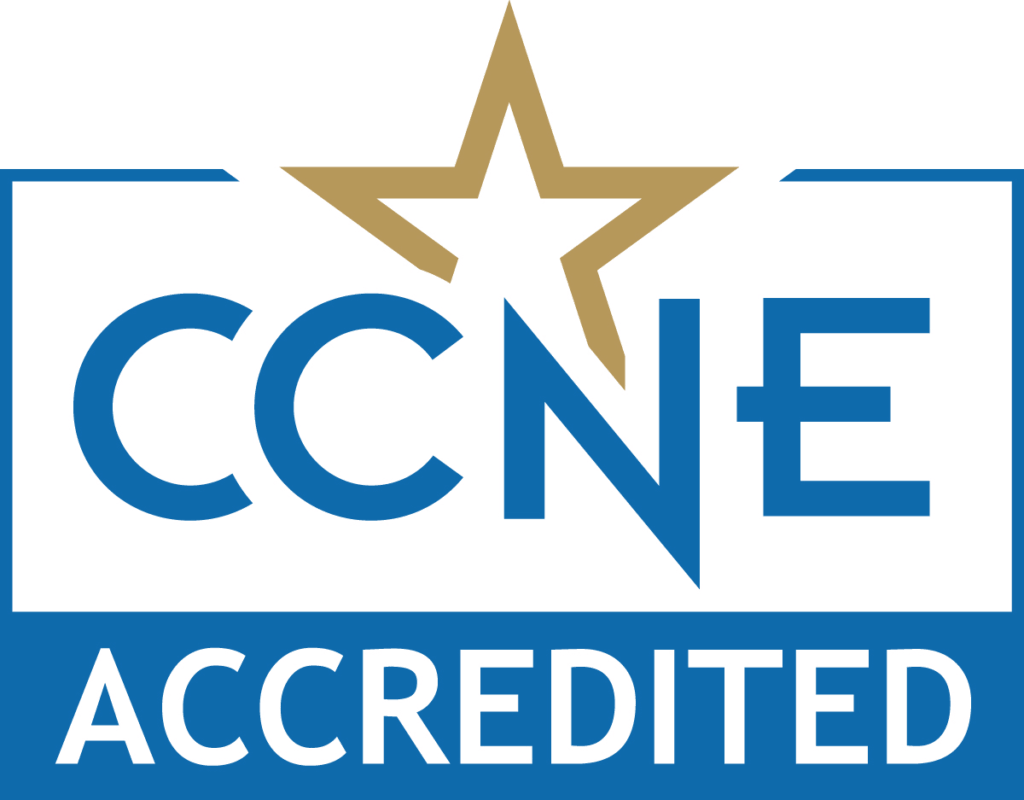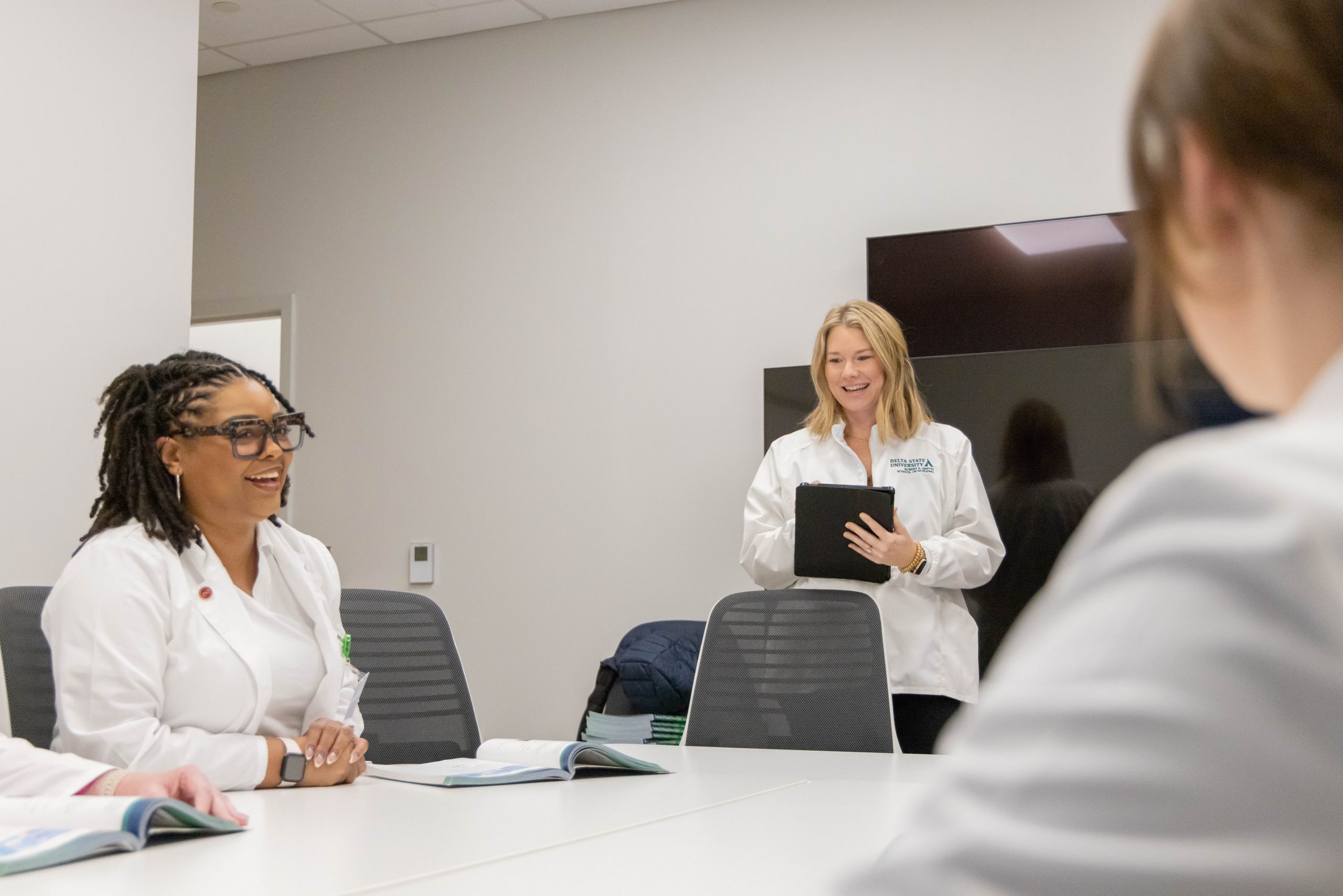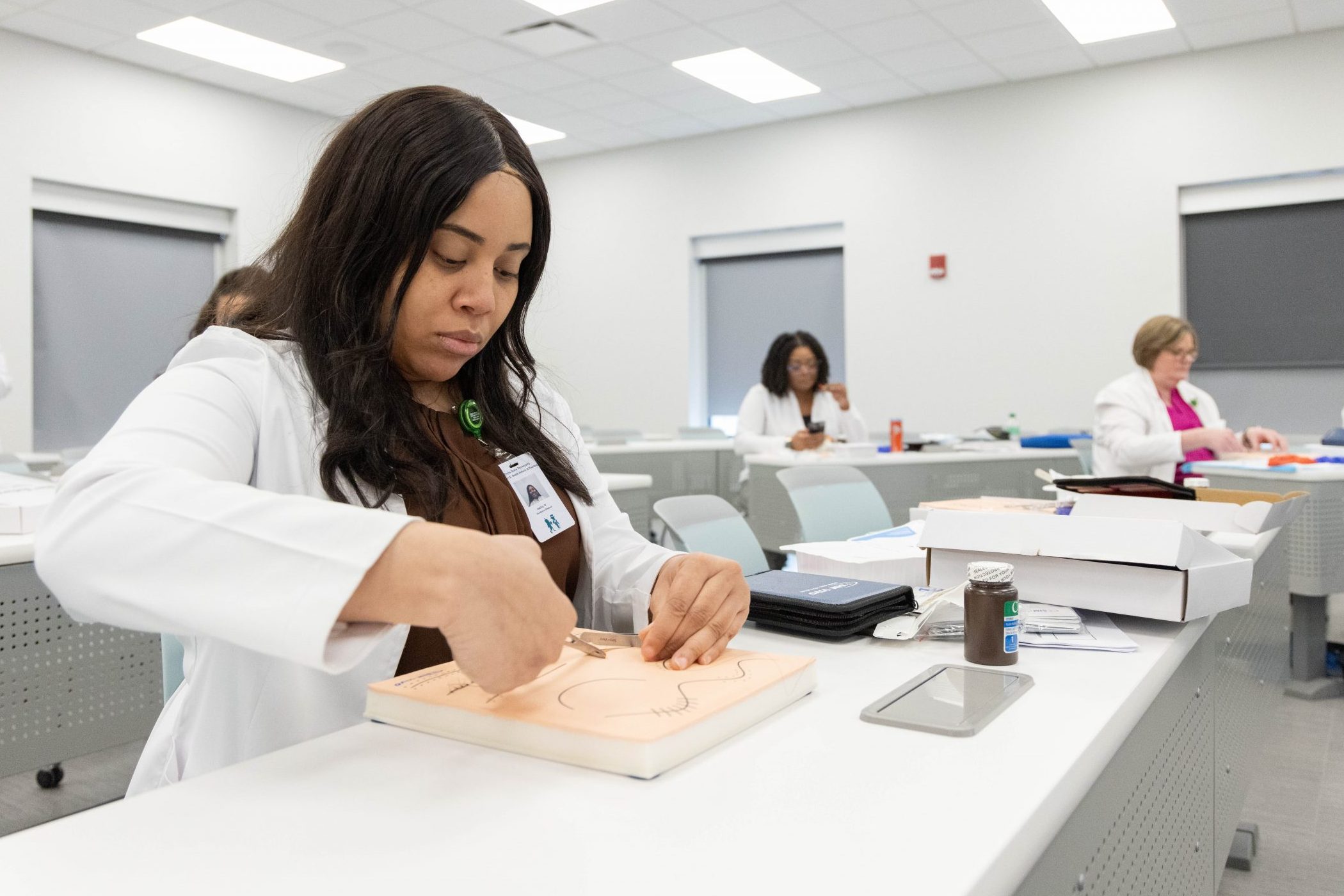The Robert E. Smith School of Nursing and Health Sciences at Delta State University offers an online Master of Science in Nursing (MSN), a flexible 2-year program designed to accommodate working registered nurses who hold a current RN license and a Bachelor of Science in Nursing (BSN). The program requires 1-3 campus visits per semester and builds upon the knowledge gained in the BSN, allowing students to develop advanced skills. The MSN degree curriculum includes core, research, and role-specific theory and practicum courses, preparing graduates to advance their careers as nurse educators or family nurse practitioners. This advanced degree not only enhances clinical expertise but also broadens career opportunities in academia and the medical field.
Online
(1-3 campus visits per semester)
Employment Rate for 2024 Graduates
Certification Pass Rate
Why Get an Online Nursing Master’s Degree at DSU?
Delta State University’s Nursing master’s degree online offers an exceptional opportunity for registered nurses to advance their careers, particularly for those aspiring to become nurse educators. The program is led by a dedicated nursing faculty with expertise in various specialties, including nurse practitioner certifications in family practice and beyond. At Delta State, the focus is on delivering a high-quality education through both online and clinical environments, with simulation integrated into the curriculum to enhance understanding of nursing concepts and patient care for diverse populations.
Despite being an online program, Delta State ensures robust student engagement through course activities, assignments, and strategically scheduled campus seminars. Clinical learning opportunities are thoughtfully arranged each semester, with efforts made to schedule them close to the student’s home community. For those pursuing the Family Nurse Practitioner (FNP) track, clinicals must be completed in Mississippi or Arkansas. With its comprehensive curriculum and strong support system, the nursing master’s program at Delta State is an ideal choice for nurses looking to elevate their skills and broaden their career opportunities in both academia and the medical field.
- Applications accepted year round
- Fall enrollment only
- Full time / Part-time options
- Nationally ranked program
- Student advisement available online
- Online program
- Flexible clinical schedule
- 1-3 campus visits per semester


The Master of Science in Nursing at Delta State University is accredited by the Commission on Collegiate Nursing Education, 655 K Street NW, Suite 750, Washington, DC 20001, 202-887-6791.
Nursing Roles in the M.S.N.

Nurse Educator
The Nurse Educator role within Delta State’s MSN program is designed to prepare individuals to excel as educators in both academic and healthcare settings. Nurse educators play a crucial role in training and educating current and future nurses, with responsibilities that include teaching, curriculum development, clinical instruction, research, student mentorship, and professional development. This concentration is ideal for those aiming to teach in academic settings, such as community colleges, where a master’s degree is sufficient, or to educate patients and staff within healthcare facilities. The curriculum includes courses such as Advanced Nursing Research & Evidence-Based Practice, Advanced Healthcare Policy and Politics, Instructional Methodologies, Informatics in Clinical Practice, and Curriculum Development & Evaluation, equipping graduates with the knowledge and skills necessary for success in diverse educational roles.

Family Nurse Practitioner
The Family Nurse Practitioner (FNP) role within Delta State’s MSN program equips students with the educational eligibility to apply for national certification through the American Academy of Nurse Practitioners (AANP) or the American Nurses Credentialing Center (ANCC) and pursue state licensure as an Advanced Practice Registered Nurse (APRN) in primary care across the lifespan. This concentration prepares students to take on vital responsibilities as Family Nurse Practitioners, including patient care, health promotion, disease prevention, patient and family education, and chronic disease management. FNPs play a critical role in improving healthcare access, particularly in underserved areas, often serving as primary care providers. While they are not medical doctors, they are highly trained APRNs capable of assessing, diagnosing, treating, and referring patients, ensuring comprehensive and continuous care.
What Can I Do with a Master’s Degree in Nursing?
A master’s degree in nursing opens up a wide array of career opportunities across various work environments. With this advanced degree, you can pursue roles in hospitals, clinics, academic institutions, and beyond, including industrial, administrative, laboratory, government, military, aviation, and even sports settings. For example, Family Nurse Practitioners (FNPs) can work in private practices, community health centers, schools, and hospitals, providing essential healthcare services to diverse populations. Additionally, a master’s degree enables you to become a nurse educator, teaching the next generation of nurses at community colleges or universities. Whether you are interested in direct patient care or educating future healthcare professionals, a master’s degree in nursing offers the flexibility to tailor your career to your interests and the growing demands of the healthcare industry.
- Chief nurse officer
- Nurse informatics
- Nursing researcher
- Patient educator
- Primary care provider
- Urgent care/Walk-in clinic practitioner
- School-based health provider
- Public health practitioner
Graduate Funding Opportunities
Graduate students at Delta State University have a number of funding opportunities available to them, including Graduate Assistantships, fellowships, scholarships, and loans. In addition, we also offer an affordable tuition rate with no additional fees for out-of-state students. We work closely with students to identify and apply for federal and state financial aid programs, as well as student loans and state scholarships. We are committed to providing our students with all of the tools necessary to succeed in the education field, including access to affordable education and financial support.
Program Goals
Our team of faculty and staff members work to ensure that our students are prepared to meet employment needs of healthcare agencies. The program goals for Master of Science in Nursing are to:
- Provide master’s nursing education that builds on the generalist foundation.
- Prepare graduates for advanced professional nursing roles with specific functional and clinical abilities.
- Prepare graduates academically to pursue education beyond the master’s level.

Student Learning Outcomes
Students can expect to achieve specific outcomes from the program. These outcomes combine to ensure that the student is qualified to meet professional standards of nursing care.
- Integrate nursing, related sciences, and emerging evidence to influence healthcare practice.
- Apply advanced knowledge, skills, and competencies to design, implement, and evaluate person-centered care.
- Integrate individual and population-based health strategies to address global healthcare needs.
- Translate theory and research to provide evidence-based nursing practice.
- Integrate quality and safety principles throughout care delivery.
- Foster professional partnership to strengthen the delivery of care and work environment.
- Coordinate resources to provide safe, quality, and equitable care to diverse populations within complex health systems.
- Promote the use of information and communication technologies to provide safe, quality, and cost-effective healthcare.
- Model professional expectations and ethical behaviors in practice and leadership roles.
- Employ leadership skills and strategies to advocate, mentor, and function within professional teams.
Admission Requirements
Admission is competitive, based on an estimate of the ability of the applicant to complete the program of studies successfully and on the appropriateness of the requested program of studies to the applicant’s stated goals. A limited number of applicants can be accommodated. In cases where there are more qualified applicants than slots available, the Robert E. Smith School of Nursing Graduate Program accepts the most qualified who apply. Specific role focus availability is dependent on sufficient enrollment in the specialty area. Full-time (four semesters) and part-time (six semesters) plans of study are an option for the nurse educator and nurse practitioner students. MSN courses are online. All enrolled students must have access to a computer, internet connection, and basic computer and internet skills. Application deadline is February 1.
There are two types of admission available for the graduate program in nursing: Full Admission and Admission with Conditions.
Students considered for Full Admission to the Graduate Program for both the MSN degree and Post Master’s Certificate in the Robert E. Smith School of Nursing must meet the following requirements:
- Apply to Delta State University Graduate School and meet admission requirements as outlined in the Delta State University Graduate Bulletin.
- Meet admission requirements to the Robert E. Smith School of Nursing Graduate Program as follows:
- Baccalaureate degree in nursing with a minimum GPA of 3.00 overall.
- Completion of Robert E. Smith School of Nursing Graduate Program Application.
- At least one year of continuous clinical nursing experience as a Registered Nurse for Nurse Educator.
- At least one year of continuous clinical nursing experience with patient contact as an RN within the past three years for Nurse Practitioner.
- Submission of a resume.
- A copy of a current unencumbered license to practice as a Registered Nurse in Mississippi or in the state in which the student will perform clinical. Individuals who hold a restricted license may or may not be eligible for admission.
- Completion of an interview conducted by Robert E. Smith School of Nursing faculty.
- A grade of “B” or better on a graduate level pathophysiology course (prerequisite).
- A grade of “C” or better on an introductory course in Statistics.
Each student will be required to submit a completed health and immunization form provided by the Robert E. Smith School of Nursing, evidence of personal health insurance and current BLS certification (infant, child, adult) after being accepted for admission.
All students must comply with Mississippi legislative statutes and regulations regarding criminal background checks by having fingerprints taken and a criminal background check completed. Any cost of this requirement will be the student’s responsibility.
Students who want to receive credit for prior nursing course(s) taken at another institution must submit a written request with supporting documentation and credit be negotiated before admission to the Robert E. Smith School of Nursing and not after the student is enrolled.
Non-degree Seeking Students
The non-degree student is enrolled in graduate courses but not admitted to a degree program in the Robert E. Smith School of Nursing. To enroll as a non-degree student, the student must seek admission to the university and obtain permission from the Chair of Nursing. A non-degree seeking student may enroll in non clinical courses: NUR 601 Advanced Theoretical Issues in Nursing and Ethics, NUR 603 Advanced Pathophysiology (pre-requisite for Educator and Practitioner students), NUR 604 Advanced Healthcare Policy and Politics.
Curriculum
The courses below are required to complete the MSN as a full-time or part-time student. Review the graduate academic catalog for more information and details.
Nurse Educator Role, Plan of Study: Full-time
Total Credit Hours: 30 | Total Clinical Hours: 420
1st Semester
| Course Number | Course Title | Credits |
| NUR 601 | Advanced Theoretical and Ethical Issues in Nursing | 2 |
| NUR 627 | Nurse Educator Practicum I (120 Clinical Hours) | 2 |
| NUR 637 | Integrated Advanced Patho/Pharm/Physical Assessment | 4 |
| NUR 641 | Role Development/Instructional Methodologies | 4 |
| TOTAL | 12/120 | |
2nd Semester (Spring)
| Course Number | Course Title | Credits |
| NUR 604 | Advanced Healthcare Policy and Politics | 2 |
| NUR 606 | Advanced Nursing Research and Evidence-Based Practice | 3 |
| NUR 629 | Nurse Educator Practicum II (120 Clinical Hours) | 2 |
| TOTAL | 7/120 | |
3rd Semester (Fall)
| Course Number | Course Title | Credits |
| NUR 628 | Assessment & Evaluation | 3 |
| NUR 632 | Curriculum Development | 3 |
| NUR 636 | Nurse Educator Practicum III (180 Clinical Hours) | 3 |
| NUR 651 | Capstone Course | 2 |
| TOTAL | 11/180 | |
Nurse Educator Role, Plan of Study: Part-time
Total Credit Hours: 30 | Total Clinical Hours: 420
1st Semester
| Course Number | Course Title | Credits |
| NUR 601 | Advanced Theoretical Issues in Nursing and Ethics | 2 |
| NUR 641 | Role Development/Instructional Methodologies | 4 |
| TOTAL | 6 | |
2nd Semester
| Course Number | Course Title | Credits |
| NUR 604 | Advanced Healthcare Policy and Politics | 2 |
| NUR 606 | Advanced Nursing Research & Evidence-Based Practice | 3 |
| TOTAL | 5 | |
3rd Semester
| Course Number | Course Title | Credits |
| NUR 628 | Assessment & Evaluation | 3 |
| NUR 627 | Curriculum Development | 3 |
| NUR 632 | Ne Practicum I (120 Clinical Hours) | 2 |
| TOTAL | 8/120 | |
4th Semester
| Course Number | Course Title | Credits |
| NUR 629 | Ne Practicum II (120 Clinical Hours) | 3 |
| NUR 637 | Integrated Advanced Patho/Pharm/Physical Assessment | 4 |
| TOTAL | 6/120 | |
5th Semester
| Course Number | Course Title | Credits |
| NUR 636 | Ne Practicum III (180 Clinical Hours) | 3 |
| NUR 651 | Capstone Course | 2 |
| TOTAL | 5/180 | |
Family Nurse Practitioner Role, Plan of Study: Full-time
Total Credit Hours: 48 | Total Clinical hours: 780
Prerequisite: NUR 603 Advanced Pathophysiology (3 credit hours)
1st Semester (Fall)
| Course Number | Course Title | Credits |
| NUR 601 | Advanced Theoretical And Ethical Issues in Nursing | 2 |
| NUR 602 | Advanced Health Assessment | 3 |
| NUR 605 | Advanced Pharmacology | 3 |
| NUR 620 | Role Synthesis (NP) | 2 |
| NUR 624 | Differential Diagnosis in Primary Care | 2 |
| TOTAL | 12 | |
2nd Semester (Spring)
| Course Number | Course Title | Credits |
| NUR 604 | Advanced Healthcare Policy and Politics | 2 |
| NUR 606 | Advanced Nursing Research and Evidence-Based Practice | 3 |
| NUR 630 | Family Nurse Practice I | 3 |
| NUR 631 | Family Nurse Practice I Practicum | 4 |
| NUR 687 | Research/Evidence-Based Practice Improvement Project | 1 |
| TOTAL | 13 | |
3rd Semester (Fall)
| Course Number | Course Title | Credits |
| NUR 634 | Family Nurse Practice II | 3 |
| NUR 635 | Family Nurse Practice II Practicum (240 clinical hours) | 4 |
| NUR 640 | Informatics in Clinical Practice | 2 |
| NUR 687 | Research/Evidence-Based Quality Improvement Project | 1 |
| TOTAL | 10 | |
4th Semester (Spring)
| Course Number | Course Title | Credits |
| NUR 638 | Family Nurse Practice Practicum III | 2 |
| NUR 639 | Family Nurse Practice III Practicum (300 clinical hours) | 5 |
| NUR 680 | Family Nurse Practitioner Review | 2 |
| NUR 687 | Research/Evidence-Based Quality Improvement Project | 1 |
| TOTAL | 10 | |
Family Nurse Practitioner Role, Plan of Study: Part-time
Total credit hours: 48 | Total clinical hours: 780
Prerequisite: NUR 603 Advanced Pathophysiology (3 credit hours)
1st Semester
| Course Number | Course Title | Credits |
| NUR 601 | Advanced Theoretical and Ethical Issues in Nursing | 2 |
| NUR 602 | Advanced Health Assessment | 3 |
| NUR 624 | Differential Diagnosis in Primary Care | 2 |
| TOTAL | 7 | |
2nd Semester
| Course Number | Course Title | Credits |
| NUR 604 | Advanced Healthcare Policy and Politics | 2 |
| NUR 606 | Advanced Nursing Research and Evidence-Based Practice | 3 |
| NUR 687 | Research/Evidence Based Practice Improvement Project | 1 |
| TOTAL | 6 | |
3rd Semester
| Course Number | Course Title | Credits |
| NUR 605 | Advanced Pharmacology | 3 |
| NUR 620 | Role Synthesis (NP) | 2 |
| NUR 687 | Research/Evidence-Based Quality Improvement Project | 1 |
| TOTAL | 6 | |
4th Semester
| Course Number | Course Title | Credits |
| NUR 630 | Family Nurse Practice I | 3 |
| NUR 631 | Family Nurse Practice I Practicum (240 clinical hours) | 4 |
| NUR 687 | Research/Evidence-Based Quality Improvement Project | 1 |
| TOTAL | 8 | |
5th Semester
| Course Number | Course Title | Credits |
| NUR 634 | Family Nurse Practice II | 3 |
| NUR 635 | Family Nurse Practice II Practicum (240 clinical hours) | 4 |
| TOTAL | 7 | |
6th Semester
| Course Number | Course Title | Credits |
| NUR 638 | Family Nurse Practice III | 2 |
| NUR 639 | Family Nurse Practice III Practicum (300 clinical hours) | 5 |
| NUR 680 | Family Nurse Practitioner Review Course | 2 |
| TOTAL | 9 | |
Licensure Requirements
The Master of Science in Nursing (MSN) curriculum meets state educational requirements for professional certification and licensure as an Advanced Practice Registered Nurse (APRN). To determine the state requirements for professional nursing licensure as an APRN, please visit the National Council of State Boards of Nursing’s (NCSBN) Nurse Licensure Guidance webpage, then select the state where you want to know the professional licensure requirements.
Degree Requirements
A candidate for the Master of Science in Nursing degree is required to meet the following:
1. Degree-seeking students take all core courses, role specific courses, and a research option to total required semester hours.
2. Certificate-seeking students take core courses and role specific courses to total required semester hours.
3. Depending upon the program of study the student must complete one of the following: a HESI APRN FNP Exam with a score of 800 or better; an APEA Post Predictor University Exam with a score of 70% during the last semester of the student’s plan of study. To take the comprehensive exam, the candidate must be enrolled in, or have completed, the final coursework and have a GPA of 3.0 or better.
4. An overall GPA of 3.0 or better is required.
5. Degree-seeking students must complete a capstone project.
Progression:
To progress in the program, the student must maintain a GPA of 3.0 or better each semester. Students must demonstrate a safe level of practice at all times in order to remain and progress in the program. Students must have all grades of “I” or “IP” removed on prerequisite courses before progressing into subsequent courses.
For more information on degree requirements, specifics on courses needed to complete the degree, and policies, consult the Graduate Academic Catalog.
Fees
Tuition at DSU covers the cost of classes.
MSN – Nurse Educator Course/Lab Fees (2025-2026)
Course/Lab fees for the BSN program are $1118.00. See below the specific courses/lab fee breakdown by semester.
Spring or Summer Pre-requisite course
| Courses | Cost |
| NUR 603* | $110 |
| TOTAL | $110 |
First Semester
| Courses | Cost |
| NUR 601 | $0 |
| NUR 602* | $399 |
| NUR 605* | $259 |
| NUR 621 | $100 |
| TOTAL | $758 |
Second Semester
| Courses | Cost |
| NUR 604 | $0 |
| NUR 606 | $230 |
| NUR 626 | $0 |
| NUR 627 | $0 |
| TOTAL | $230 |
Third Semester
| Courses | Cost |
| NUR 628 | $20 |
| NUR 629 | $0 |
| NUR 640 | $0 |
| NUR 687 | $0 |
| TOTAL | $20 |
Fourth Semester
| Courses | Cost |
| NUR 632 | $0 |
| NUR 633 | $0 |
| NUR 636 | $0 |
| NUR 687 | $0 |
| TOTAL | $0 |
*Instructors may require exam proctoring services to verify student identity to minimize the risk of academic dishonesty. When required, these services may include an additional cost to the student.
MSN – Family Nurse Practitioner Course/Lab Fees (2025-2026)
Course/Lab fees for the BSN program are $2725.00. See below the specific courses/lab fee breakdown by semester.
Spring or Summer Pre-requisite course
| Courses | Cost |
| NUR 603* | $110 |
| TOTAL | $110 |
First Semester
| Courses | Cost |
| NUR 601 | $0 |
| NUR 602* | $250 |
| NUR 605* | $110 |
| NUR 620 | $115 |
| NUR 624 | $0 |
| TOTAL | $475 |
Second Semester
| Courses | Cost |
| NUR 604 | $0 |
| NUR 606 | $0 |
| NUR 630 | $375 |
| NUR 631 | $415 |
| TOTAL | $790 |
Third Semester
| Courses | Cost |
| NUR 634 | $305 |
| NUR 635 | $195 |
| NUR 640 | $0 |
| NUR 687 | $0 |
| TOTAL | $500 |
Fourth Semester
| Courses | Cost |
| NUR 638 | $0 |
| NUR 639 | $75 |
| NUR 680* | $775 |
| NUR 687 | $0 |
| TOTAL | $850 |
*Instructors may require exam proctoring services to verify student identity to minimize the risk of academic dishonesty. When required, these services may include an additional cost to the student.
Program Contact
Dr. Addie Herrod
Chair of the Robert E. Smith School of Nursing and Health Sciences
P: 662-846-4255
F: 662-846-4271
nursing@deltastate.edu

